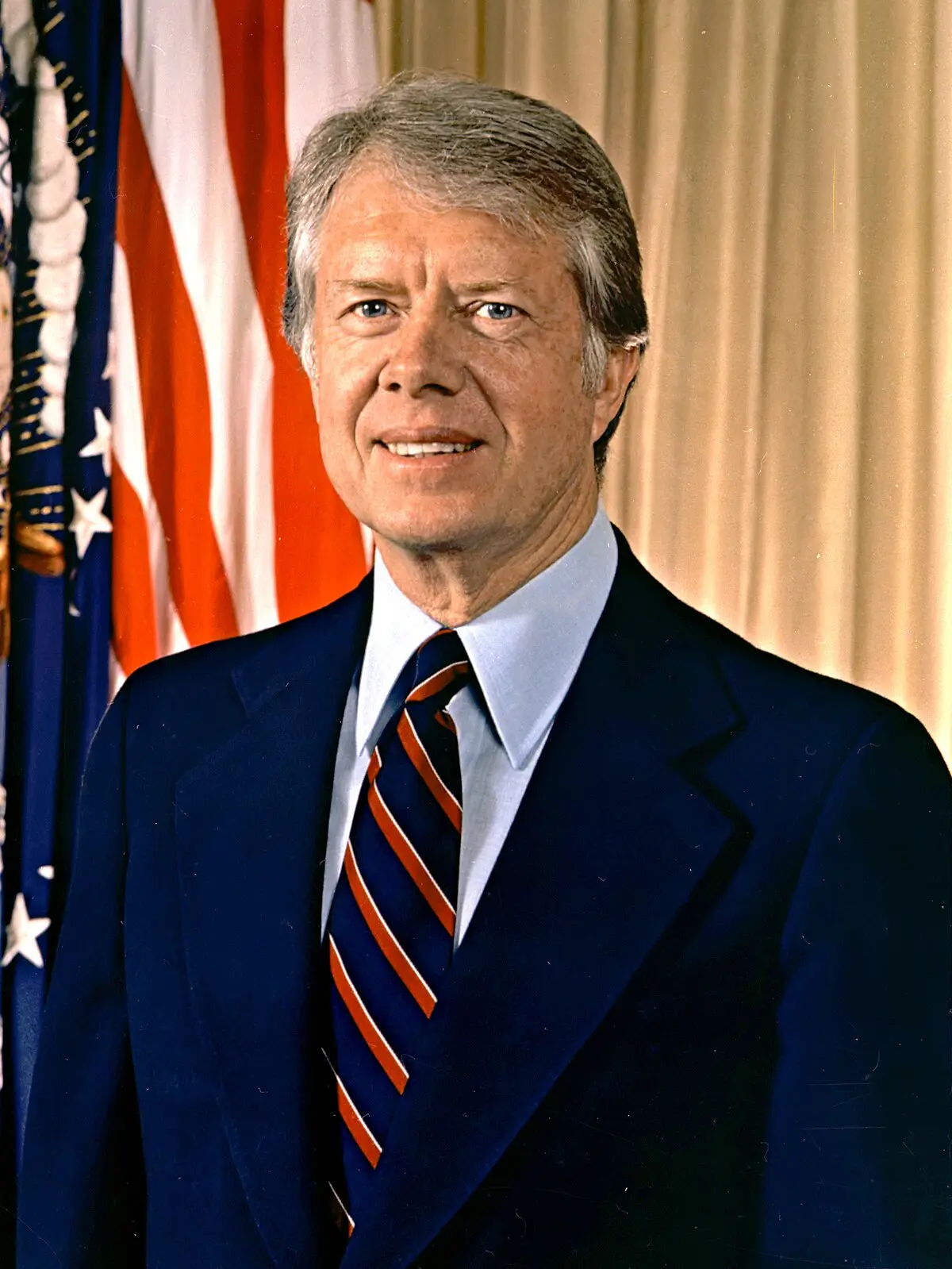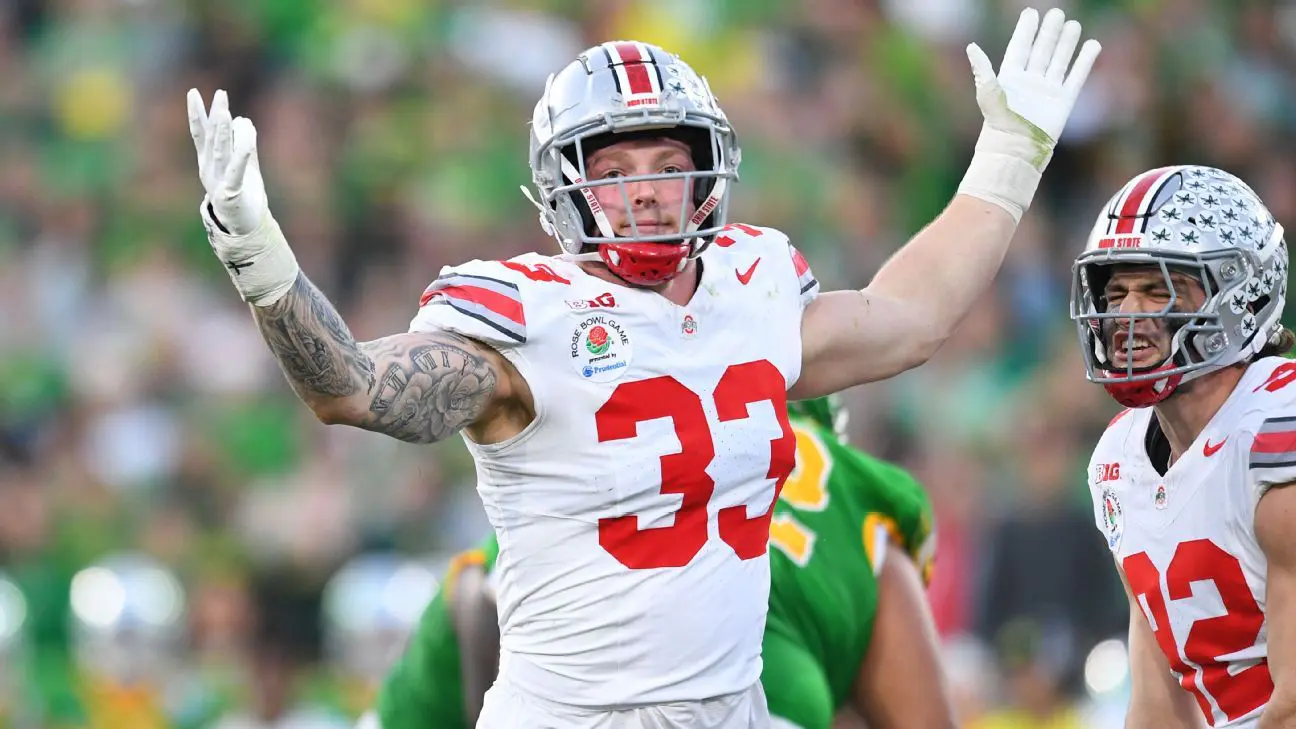An American hostage during the Iran crisis remembers Jimmy Carter
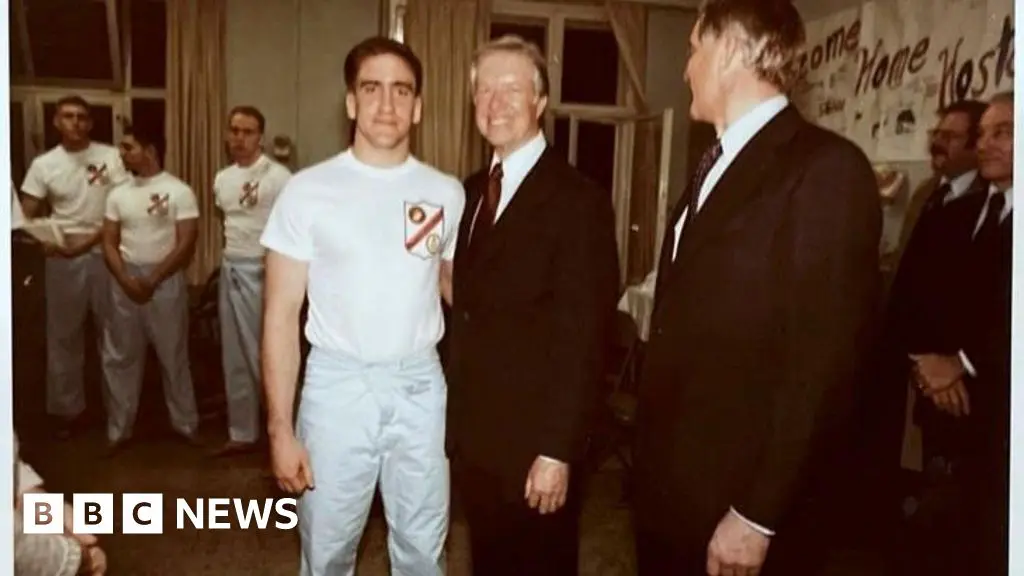
Out of the many mourning former President Jimmy Carter, not everyone can say he saved their life.
Rocky Sickmann was a 22-year-old US Marine stationed at the American embassy in Tehran, Iran, when he and 51 other Americans were taken hostage by Iranian revolutionaries on 4 November, 1979.
It defined his life - as well as much of Carter's presidency.
"For the first 30 days I'm sitting in this room handcuffed and blindfolded, thinking the Vietnam war had just ended, and nobody cared about these thousands of veterans coming home," said the 67-year-old. "Who's going to care about the Iran hostages?"
He said that at the time, he wasn't even sure how much President Carter cared. It was a sentiment echoed by much of the American public. Many blamed Carter for his failure to bring the hostages home for over a year.
Political historians say part of the reason Carter lost to Ronald Reagan in a landslide - and served only one term as president - was because of his handling of the hostage crisis.
Minutes after Reagan was sworn in, the hostages were released, although the deal had been in the works during Carter's presidency.
Mr Sickmann said that Carter deserves to be forever admired for his relentless attempt to bring them home.
"He was a good man who wanted diplomacy. I found out after how deeply involved he was. He knew my parents. He took care of them, he would meet them in DC."
When Mr Sickmann finally got to meet Carter himself, he wasn't exactly dressed for the occasion.
He laughs: "We met him in our pyjamas! How do you meet your commander-in-chief dressed like that!"
Rocky was flown out with the other hostages to Wiesbaden, Germany, a year after they had been taken hostage. The day after they got there, Carter greeted them personally.
"It was a very exciting day because he used to be in the Marines and he said to meet us was the happiest day of his life."
The meeting was captured in a photograph, which Carter would send to Sickmann 10 months after he had been voted out of the White House. It was signed: 'To my friend, Rocky Sickmann".
But it was not the last time that Mr Sickmann saw him. Just 10 years ago, he ran into Carter at a baseball game in Georgia. He had an usher pass the former president a note.
"He reads it - all of a sudden he gets up and he stands up and he turns around. I stand up and we waved at each other."
Like Carter, Mr Sickmann went on to focus on charitable work. He said he was inspired by the former president to set up Folds of Honor, which provides scholarships to families of Americaʼs fallen or disabled military and first responders.
"President Carter was a good Christian man, married to his wonderful wife, and continued his life of service. I don't know if I'll ever be as good as him but I hope to be able to do the same thing."
The charity was set up to honor the 8 US service men who were killed trying to rescue the hostages. In 1980, the mission, dubbed Eagle Claw, failed disastrously after three helicopters malfunctioned. It was the last straw for Carter politically - although he won the Democratic nomination, he was wiped out in the election by Ronald Reagan that year.
But while the Iran hostage crisis would be a dark mark on Carter's political legacy, Mr Sickmann said he owes his life to Jimmy Carter.
"Morning, noon, and night, for 444 days, I never prayed so hard in my life, hoping that God was on our side," he said.
"But also President Carter kept us alive. He kept us in front of the world, making sure that people were praying for us (too)."
Jimmy Carter lies in state at the U.S. Capitol as Americans pay their respects
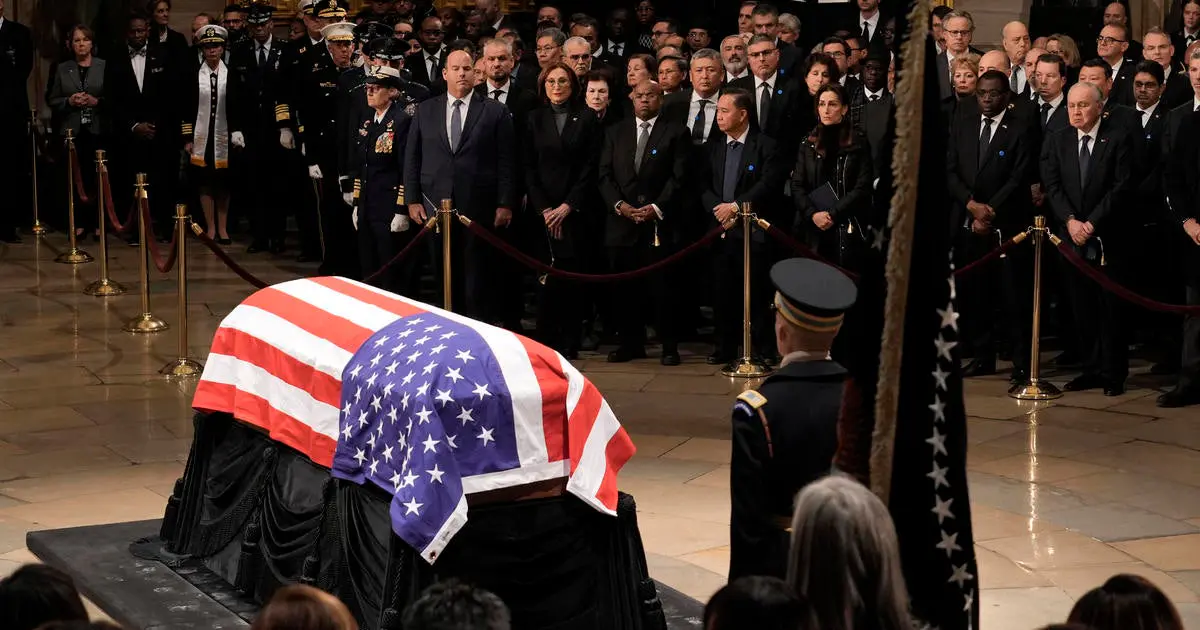
Former President Jimmy Carter's casket arrived at the U.S. Capitol Tuesday afternoon for a military tribute and to lie in state in the U.S. Capitol Rotunda, with lawmakers and members of public invited to pay their respects.
The streets of Washington, D.C., with the ground covered in snow from a recent storm, were quiet Tuesday as his casket passed. Members of Congress, Vice President Kamala Harris, Cabinet secretaries and Carter's family members then paid their respects in a service in the Capitol Rotunda. Supreme Court Justice Sonia Sotomayor paid her respects on Wednesday morning, as did representatives from the Navy and representatives from several other groups that worked closely with Carter.
Carter, the 39th president, died on Dec. 29 at the age of 100 — living longer than any president in U.S. history. His beloved wife of 77 years, Rosalynn, died in November 2023.
"Today, we gather to begin a final farewell to Jimmy Carter — Navy veteran, peanut farmer, governor of Georgia, and president of the United States," said Senate Majority Leader John Thune, a South Dakota Republican, on Tuesday. "Sunday school teacher, Nobel prize winner, advocate for peace and human rights, and first and foremost, a faithful servant of his creator, and of his fellow man."
House Speaker Mike Johnson, a Louisiana Republican, said Carter "modeled the virtues of service and citizenship as well as any other American," noting Carter's volunteer work for Habitat for Humanity and efforts to broker peace and equality.
Harris called Carter "a forward-looking president with a vision for the future" who was an "all too rare example of a gifted man who also walks with humility, modesty and grace."
"James Earl Carter Jr. loved our country. He lived his faith, he served the people and he left the world better than he found it," Harris said. "And in the end, Jimmy Carter's work and those works speak for him louder than any tribute we can offer."
The state funeral is set for Thursday. President Biden will be delivering a eulogy at Thursday's service, along with several others. President-elect Donald Trump said he will attend.
Sources told CBS News that also expected to attend were first lady Jill Biden, former President Clinton and his wife, former Secretary of State Hillary Clinton, former President George W. Bush and his wife, Laura Bush, and former President Barack Obama. His wife, Michelle Obama, was not expected to attend.
Carter lay in repose in Atlanta as part of six days of observances that began Saturday with a service at his boyhood home in Plains, Georgia. The Carter Center said Tuesday morning that more than 23,000 people came to pay their respects to the former president.
"This is somebody from a small town in south Georgia who was a peanut farmer who ultimately became the president of the United States," said Carter's grandson, Jason Carter, at the Plains service on Saturday. "It's a pretty remarkable American story."
On Tuesday, Carter's body was flown Atlanta to Joint Base Andrews in Maryland, where his casket was transferred with ceremony to a hearse. From there, a motorcade traveled to the U.S. Navy Memorial, where his casket was transferred from a hearse to a horse-drawn caisson with ceremony.
Carter will lie in state in the Capitol Rotunda until Thursday, and members of the public will be able to pay their respects. His funeral service Thursday will be held at the National Cathedral before his remains are flown back to Georgia.
There will be a final private service in Plains, and Carter will be buried next to Rosalynn Carter at his family's peanut farm.
Georgia
Washington, D.C.
Arden Farhi and Jacob Rosen contributed to this report.
Jimmy Carter’s woodworking, painting and poetry reveal an introspective Renaissance Man
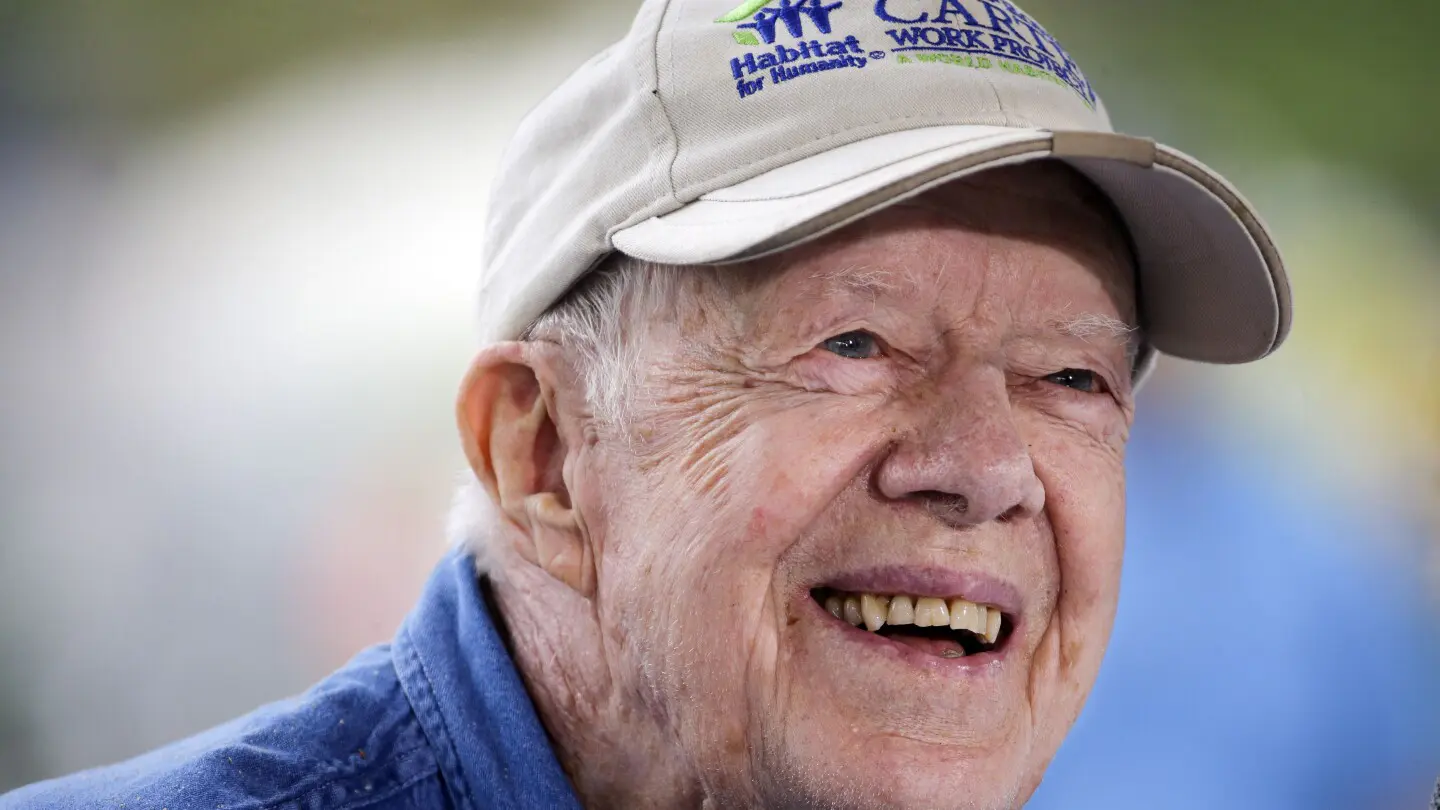
PLAINS, Ga. (AP) — The world knew Jimmy Carter as a president and humanitarian, but he also was a woodworker, painter and poet, creating a body of artistic work that reflects deeply personal views of the global community — and himself.
His portfolio illuminates his closest relationships, his spartan sensibilities and his place in the evolution of American race relations. And it continues to improve the finances of The Carter Center, his enduring legacy.
Creating art provided “the rare opportunity for privacy” in his otherwise public life, Carter said. “These times of solitude are like being in another very pleasant world.”
Mourners at Carter’s hometown funeral will see the altar cross he carved in maple and collection plates he turned on his lathe. Great-grandchildren in the front pews at Maranatha Baptist Church slept as infants in cradles he fashioned.
The former president measured himself a “fairly proficient” craftsman. Chris Bagby, an Atlanta woodworker whose shop Carter frequented, elevated that assessment to “rather accomplished.”
Carter gleaned the basics on his father’s farm, where the Great Depression meant being a jack-of-all-trades. He learned more in shop class and with Future Farmers of America. “I made a miniature of the White House,” he recalled, insisting it was not about his ambitions.
During his Navy years, Jimmy and Rosalynn Carter chose unfurnished military housing to stretch his $300 monthly wage, and he built their furniture himself in a shop on base.
As president, Carter nurtured woodworking rather than his golf game, spending hours in a wood shop at Camp David to make small presents for family and friends. And when he left the White House, West Wing aides and Cabinet members pooled money for a shopping spree at Sears, Roebuck & Co. so he could finally assemble a full-scale home woodshop.
“One of the best gifts of my life,” Carter said.
Working in their converted garage, he previewed decades of Habitat for Humanity work by refurbishing their one-story house in Plains. He also improved his fine woodworking skills, joining wood without nails or screws. He also bought Japanese carving tools, and fashioned a chess set later owned by a Saudi prince.
Carter frequented Atlanta’s Highland Woodworking, a shop replete with a library of how-to books and hard-to-find tools, and recruited the world’s preeminent handmade furniture maker, Tage Frid, as an instructor, Bagby said.
Still hanging near the store entrance is a picture of Frid, who died in 2004, teaching students including a smiling former president at the front of the class.
“He was like a regular customer,” Bagby said, other than the “Secret Service agents who came with him.”
Carter built four ladder-back chairs out of hickory in 1983, and Sotheby’s auctioned them for $21,000 each at the time, the first of many sales of Carter paintings and furniture that raised millions to benefit The Carter Center.
It was rarely about the money, though. Jill Stuckey, a longtime friend who would have the Carters over to her home in Plains, recalled seeing the former president carrying out one of her chairs.
“I said, ‘What are you doing?’” she recalled. “He said, ‘It’s broken. I’m going to take it home and fix it.’”
He was at her back door at 7:30 the next morning, holding her repaired chair.
Carter compared woodworking to the results of his labor as a Navy engineer, or as a boy on the farm: “I like to see what I have done, what I have made.”
Carter employed a folk-art style as a late-in-life amateur painter and claimed “no special talent,” but a 2020 Carter Center auction drew $340,000 for his painting titled “Cardinals,” and his oil-on-canvas of an eagle sold for $225,000 in 2023, months after he entered hospice care.
Carter’s work hangs throughout the center’s campus. A room where he met with dignitaries is encircled with birds he painted after he and Rosalynn took on bird watching as a hobby.
Near the executive offices are a self-portrait and a painting of Rosalynn in their early post-presidential years, hanging across from a trio of Andy Warhol prints showing Carter in office.
Carter’s earliest years predominate, with boyhood farm scenes and portraits of influential figures like his father James Earl Carter Sr., whose death in 1953 led him to abandon a Navy career and eventually enter politics in Georgia.
Some of his subjects, including both of his parents, are looking away. Carter’s likeness of his mother shows “Miss Lillian” as a 70-year-old Peace Corps volunteer in India. Jason Carter said the piece was particularly meaningful to his grandfather, who lost reelection at a relatively youthful 56.
“When he got out of the White House, she was standing there saying, ’Well, I turned 70 in the Peace Corps. What are you going to do?” Jason Carter said.
One Carter subject who meets his gaze is a young Rosalynn — they married when she was 18 and he was 21. He described her as “remarkably beautiful, almost painfully shy, obviously intelligent, and yet unrestrained in our discussions.”
Another who doesn’t look away is Rachel Clark, a Black sharecropper who had hosted the future president after they worked in the fields. “Except for my parents, Rachel Clark was the person closest to me,” Carter wrote of his childhood.
Carter wrote more than 30 books — even a novel — but was most introspective in poetry.
On his first real recognition of Jim Crow segregation: “A silent line was drawn between friend and friend, race and race.”
On his Cold War submarine’s delicate dance with enemies: “We wanted them to understand ... to share our love of solitude ... the peace we yearned to keep.”
Rosalynn’s smile, he gushed, silenced the birds, “or may be I failed to hear their song.”
Perhaps Carter’s most revealing poem, “I Wanted to Share My Father’s World,” concerns the man who never got to see his namesake son’s achievements. He wrote that he despised Earl’s discipline, and swallowed hunger for “just a word of praise.”
Only when he brought his own sons to visit his dying father did he “put aside the past resentments of the boy” and see “the father who will never cease to be alive in me.”
Jimmy Carter turns 100
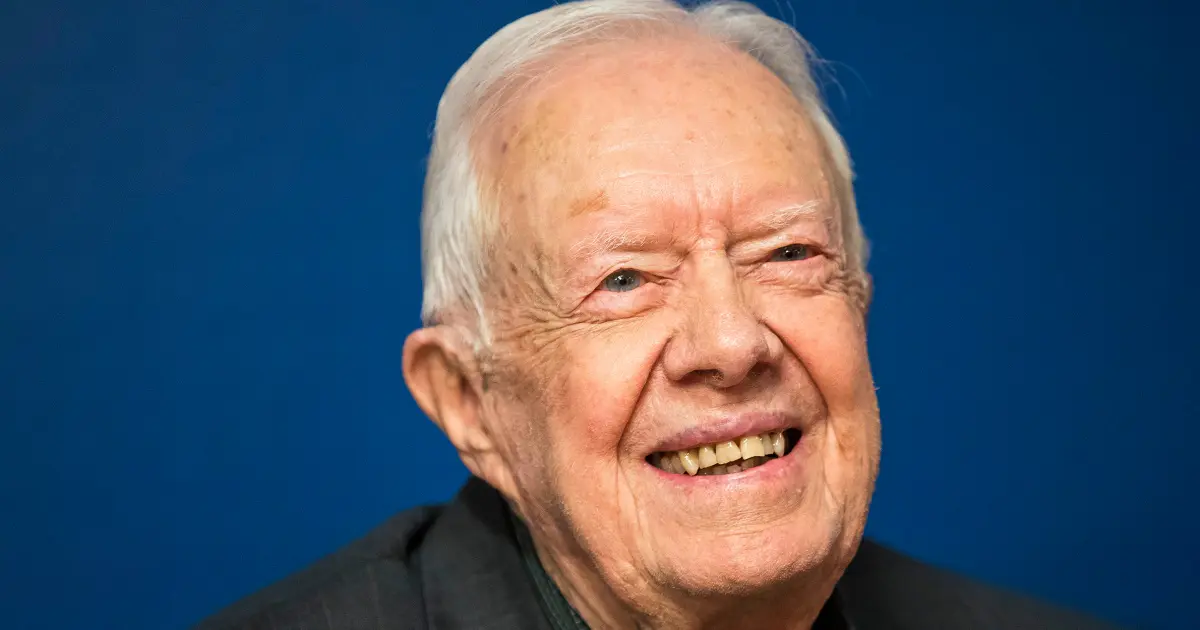
Jimmy Carter has accomplished something no other former U.S. president has — he notched a 100th birthday.
Carter, who served one term in the White House, hit the milestone Tuesday at his home in Plains, Georgia, where he has been receiving hospice care for the last 19 months.
The proud Democrat, who has grown increasingly weaker in recent months, has told relatives he wants to hang on until Oct. 15, when early voting begins in Georgia, so he can cast his ballot in the 2024 presidential election.
“I’m only trying to make it to vote for Kamala Harris,” Carter said, his grandson Jason Carter told The Atlanta Journal-Constitution.
A former peanut farmer and Navy veteran, Carter has lived nearly six years longer than another age-defying former president, George H.W. Bush, a Republican who was 94 years and 171 days old when he died on Nov. 30, 2018.
Some of Carter's other successors went online to wish him a Happy Birthday.
"To put it simply: I admire you so darn much," President Joe Biden posted.
Former President Barack Obama, in an online post, lauded Carter's "accomplishments in the White House, his incredible impact since leaving office, his fundamental decency."
"You've had a heckuva life," former President George W. Bush said on X. "May God bless you in your final years. May you have peace of mind and peace in your heart. "
Carter marked his 100th birthday 10 days after his life and legacy was celebrated with a star-studded concert at the Fox Theater in Atlanta that featured performances of “Love Shack” by Georgia’s own B-52’s and covers of some of the best-known songs by The Allman Brothers, a Southern rock band that raised money for Carter’s successful presidential campaign in 1976.
The involvement of what was then one of the nation’s most popular bands in Carter's campaign earned the famously strait-laced candidate the unlikely nickname of “the rock ‘n’ roll president.”
While the guest of honor couldn’t be in Atlanta for his shindig, the concert was intended to be a gift for the 39th president, and Carter was expected to watch the special on Georgia Public Television as part of his private family celebration.
Not in attendance at his 100th birthday bash was the love of his long, long life, his wife, Rosalynn Carter, who died last November at 96. He made an appearance at her tribute service in a wheelchair, his legs covered in a blanket adorned with both their faces on it.
Their last public appearance together was in September 2023, when they were spotted riding in a black SUV at the Plains Peanut Festival.
Carter served in the White House from 1977 to 1981, during which he presided over the Camp David Accords that ended years of conflict between Israel and Egypt, made human rights integral to U.S. foreign policy and took a hard line against the Soviet Union.
After losing his bid for re-election to Ronald Reagan, Carter helped turn Habitat for Humanity into a worldwide force for good. And he established the Carter Center to promote and expand human rights, an effort that earned him a Nobel Peace Prize in 2002.
Promoting democracy was, in many ways, Carter's life's work. A year after supporters of former President Donald Trump stormed the U.S. Capitol to try to stop the certification of President Joe Biden's election, Carter wrote in an opinion piece for The New York Times that "promoters of the lie that the election was stolen have taken over one political party and stoked distrust in our electoral systems."
Ever the Southern gentleman, Carter did not mention Trump by name.
Jimmy Carter, former president and humanitarian, dies at 100
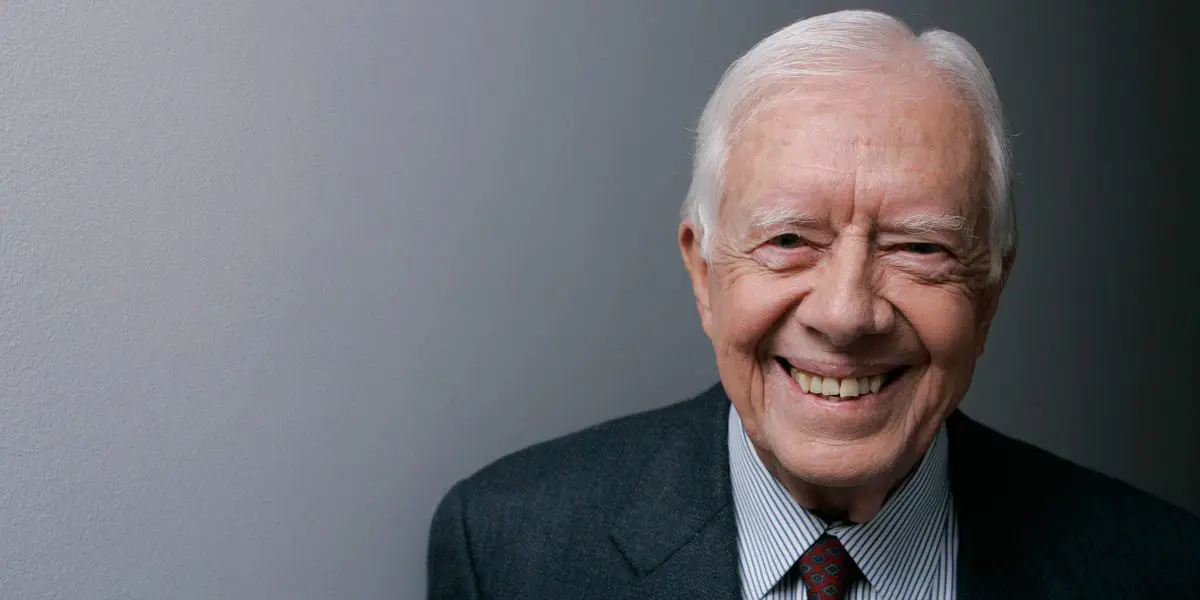
Former President Jimmy Carter, who rose from humble beginnings in rural Georgia to the White House and was renowned for his global charity work, has died at age 100.
He died Sunday in his Plains, Georgia home, The Carter Center — the former president's nonprofit organization — confirmed in a statement posted to social media.
"My father was a hero, not only to me but to everyone who believes in peace, human rights, and unselfish love," said Chip Carter, the former president's son, said in the statement released by the Carter Center. "My brothers, sister, and I shared him with the rest of the world through these common beliefs. The world is our family because of the way he brought people together, and we thank you for honoring his memory by continuing to live these shared beliefs."
President Joe Biden in an address to the nation said a major service for former president Carter would be hosted in Washington DC.
"Jimmy Carter lived a life measured not by words, but by his deeds," Biden said. "On behalf of the world, and the whole nation, we send our whole heartfelt sympathies and our gratitude for sharing President Carter for so many years."
The Carter Center in February 2023 announced that the former president would enter hospice care to "spend his remaining time at home with his family" following several hospital stays. After almost a year and a half in hospice, Carter's grandson, Jason, said the former president was "coming to the end."
Carter had previously been treated for brain and liver cancer, was hospitalized after a fall in 2019, and had surgery the same year to relieve a buildup of pressure around his brain.
Presidents often fade into the background after they leave the White House, but Carter — the 39th president of the United States — was in many ways a more popular, impactful figure after his single tumultuous term from 1977 to 1981.
Carter has often been referred to as the best ex-president in history, a compliment he seemed to embrace.
He came to be admired for his amiable demeanor and lifelong dedication to public service and humanitarianism. Carter was a US Navy veteran and a Nobel laureate.
He was preceded in death by his wife of 77 years, Rosalynn Carter, who died in November 2023 at age 96. He is survived by his four children, 11 grandchildren, and 14 great-grandchildren.
Carter, whose full name was James Earl Carter Jr., was born October 1, 1924, in Plains, Georgia. His father was a peanut farmer who'd served in the Georgia state legislature. His mother, Lillian Gordy Carter, served as a nurse, civil- and women's-rights activist, and Peace Corps volunteer in India at the age of 68 in 1966. The Carters were deeply tied to their Baptist faith.
Carter graduated from the US Naval Academy in Annapolis, Maryland, in 1946. He served in the Navy for seven years before returning to Georgia to take over his family's peanut farm after his father died.
Carter entered state politics as a Democrat in the early 1960s and in 1970 was elected to the Georgia governorship. In 1974, he announced his candidacy for the Democratic nomination for president.
Initially, Carter was pegged as a long shot given his lack of political connections and the fact he was relatively unknown nationally.
But Carter painted himself as an honest outsider with strong morals at a time when many Americans were disillusioned with Washington over the Watergate scandal, and his campaign gradually gained momentum.
He repeatedly told voters, "I'll never tell a lie."
Carter's longtime embrace of civil rights was also crucial to his victory.
After being elected governor, Carter declared during his inaugural address, "I say to you quite frankly that the time for racial discrimination is over."
He carried these sentiments into his presidential campaign and allied himself with key Black members of Congress. Carter received overwhelming support from Black voters, especially in the South, which propelled him to the White House.
Carter won the Democratic nomination in July 1976, choosing then-Sen. Walter Mondale of Minnesota as his running mate against President Gerald Ford, the Republican incumbent. Carter defeated Ford in November of that year, winning 50.1% of the popular vote and capturing 297 electoral votes to Ford's 240.
The Georgian swept the Deep South, the last Democrat to do so on the presidential level, while also carrying important battlegrounds like Ohio and Pennsylvania.
As president, Carter sought to portray himself as a man of the people and make the presidency more accessible.
After he was sworn in, Carter and his wife walked to the White House, launching an informal tradition followed by subsequent presidents at their inaugurations.
He also spoke and dressed in a less formal manner and held frequent press conferences.
Carter entered office as a popular figure pushing for ambitious programs to address the country's myriad social and economic woes. His administration had a historically large number of women, Black, and Latino members and staff.
Though Carter's image as an "outsider" seemed to be advantageous during his campaign, it hurt him with Congress once he was in the White House. He struggled to get lawmakers on board with his bold proposals for reform, and his approval ratings tanked as he struggled to push his proposals through the legislative branch.
A scandal in the summer of 1977 didn't help matters. At the time, Bert Lance, the director of the Office of Management and Budget, was accused of being involved in dubious financial activities as a Georgia banker. Carter at first defended Lance, whom he saw as a close friend, but ultimately called on him to resign.
In 1979, amid an energy crisis and recession, Carter delivered his infamous "crisis in confidence" speech, contending that the nation needed to restore its faith in itself. The speech was well-received at first but was ultimately not a particularly successful selling point.
Despite the many challenges Carter faced, his presidency wasn't without major accomplishments.
On the domestic front, his achievements included establishing the Department of Education and the Department of Energy and expanding the national parks system. His actions helped lay the framework for future administrations to tackle America's educational and energy needs.
But Carter's biggest accomplishments as president came in the foreign-policy arena.
He facilitated the first peace treaty between Israel and Egypt, known as the Camp David Accords. Carter also established full diplomatic relations between the US and China and orchestrated two important treaties between the US and Panama.
Carter also stood up to the Soviet Union on human rights and completed negotiation of the SALT II nuclear-limitation treaty (though the treaty ultimately fell through with the Soviet invasion of Afghanistan).
Carter's progress in the realm of foreign policy was in many ways overshadowed by the 1979 Iran hostage crisis.
Amid a revolution in Iran that saw a pro-US government ousted, a mob of students stormed the US Embassy in Tehran and took the staff members as hostages. The revolutionary Iranian government, led by Ayatollah Ruhollah Khomeini, supported the actions of the students. The US Embassy staff members were ultimately held hostage for hundreds of days.
The timing of the crisis and Carter's perceived failure to secure the release of the hostages, which included a disastrous military operation that failed to rescue them, was deeply damaging to his image domestically.
Combined with an economy in turmoil, the hostage crisis was a large part of the reason Carter lost reelection in a landslide to former Gov. Ronald Reagan of California in 1980. In that race, Carter's support had diminished across the South and in the Midwestern and Northeastern states that boosted his first presidential bid; he earned 49 electoral votes to Reagan's 489.
Carter's administration negotiated the release of the hostages during his final days in office, and they were freed the same day as Reagan's inauguration.
Carter spent most of his postpresidential years championing human rights and pushing for peace in various corners of the world. He founded The Carter Center to focus on such issues in 1982 and played an active role with Habitat for Humanity until the end of his life.
As a private citizen, Carter worked for peace everywhere from North Korea to Haiti. He received the Nobel Peace Prize in 2002 for what the Norwegian Nobel Committee described as his "decades of untiring effort to find peaceful solutions to international conflicts, to advance democracy and human rights, and to promote economic and social development."
After he left the White House, Carter moved back to Plains, Georgia.
He's the only US president in the modern era to return to the two-bedroom house he lived in before ascending to the highest office in the land.
Carter favored a humble lifestyle. He was known to fly on commercial airliners, unlike other past presidents who preferred private jets, and was filmed walking up and down the aisle to shake the hands of other passengers.
He also cost US taxpayers far less per year than any other former president, according to the General Services Administration, in large part because he avoided extravagances.
Carter was a former president longer than anyone else in US history.
In 1954, the chief of police and a Baptist minister in Plains asked Carter to join the local White Citizens' Council, a pro-segregation organization.
The peanut farmer said no, and a few days later the men came back to tell Carter he was the only white man in the community who hadn't joined. Carter told them he didn't care.
The police chief and minister returned a third time and said they would pay the $5 membership fee for Carter if that's what was holding him back. He was also warned that his peanut business would face a boycott if he didn't join.
In response, Carter told them: "I've got $5. And I'd flush it down the toilet before I'd give it to you."
Throughout Carter's long life, he frequently proved unafraid to stray from the pack, even if it made him at times unpopular.
Photos show President Jimmy Carter funeral procession, lying in state in the Capitol Rotunda
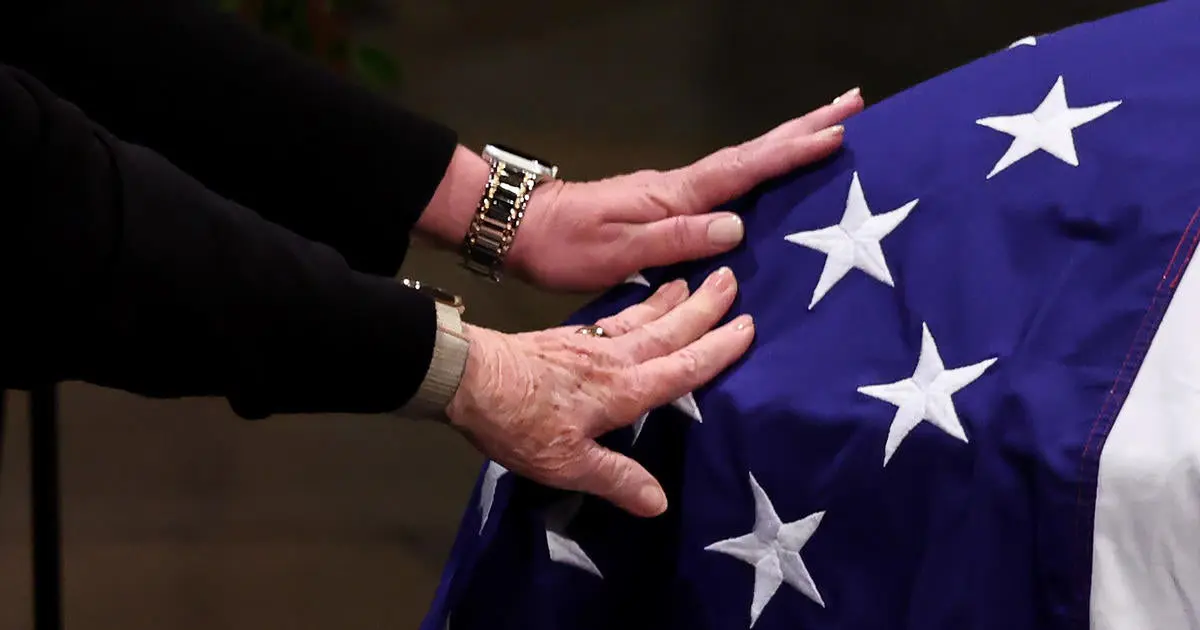
Former President Jimmy Carter has been lying in state in the U.S. Capitol Rotunda — the 35th person in American history to receive such an honor — ahead of his state funeral scheduled for Thursday.
Carter's casket arrived in Washington, D.C., on Tuesday, with the motorcade stopping at the Navy Memorial before traveling to the U.S. Capitol. Members of his family traveled along with the casket for the trip.
Members of the public, lawmakers and other dignataries have been paying their respects to Carter. Vice President Kamala Harris, second gentleman Doug Emhoff and Senate Majority Leader John Thune all spoke on Tuesday after his casket arrived at the Rotunda.
Carter, the 39th president, died on Dec. 29 at the age of 100, and he will be buried in Plains, Georgia, next to his beloved wife of 77 years, Rosalynn, who died in November 2023.
Here are some photos from Carter's final journey to Washington, D.C.:
Former President Jimmy Carter spent his last 43 years living in a $167,000 house—less expensive than the Secret Service vehicles outside
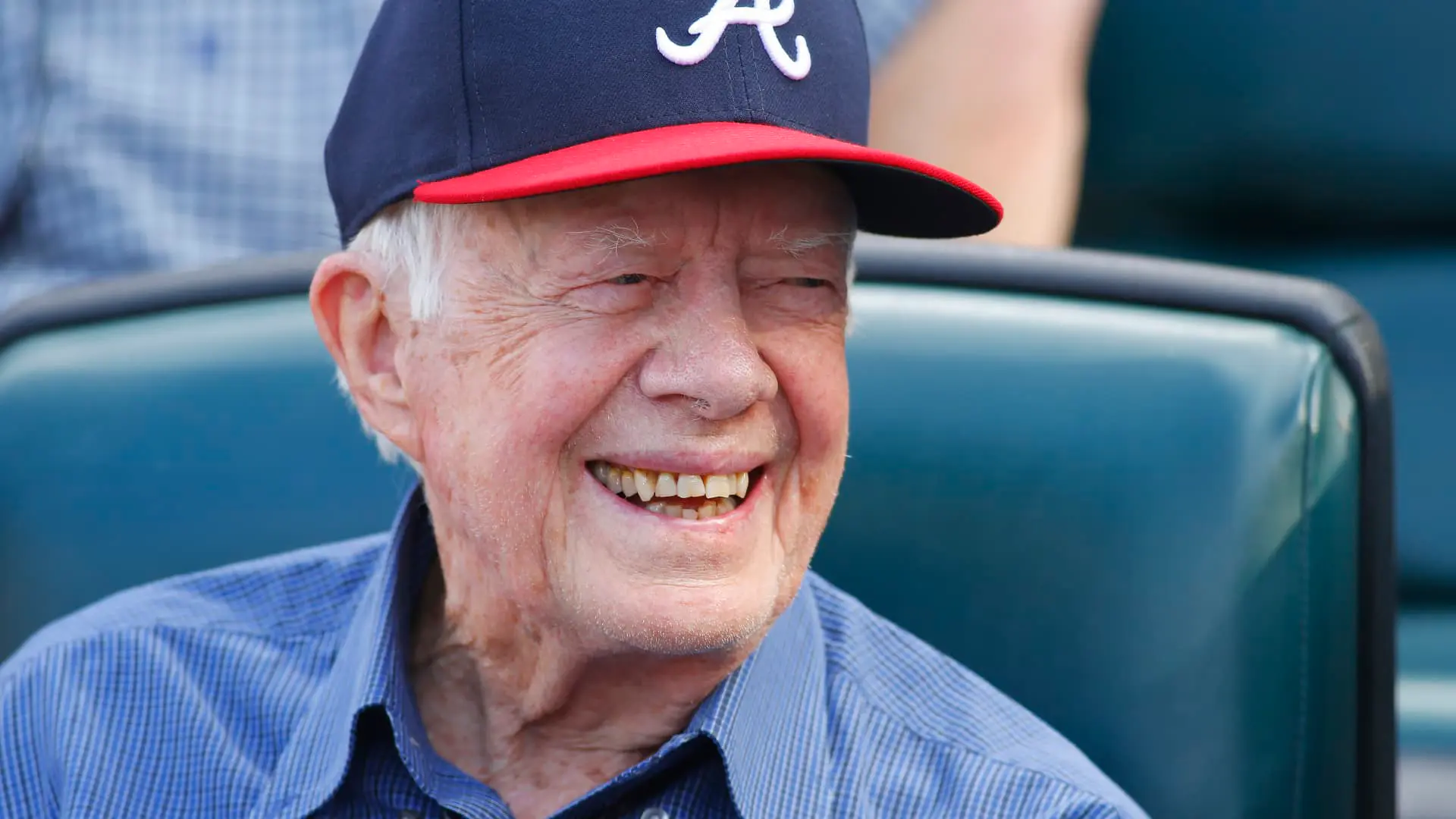
After leaving the White House in 1981, former President Jimmy Carter spent his next 43 years living in a much more modest abode.
Carter, the nation's 39th president, died on December 29. 2024, at age 100 — the first U.S. president to ever reach his centennial birthday. Carter's funeral will be held at the National Cathedral in Washington, D.C. on January 9, and President Joe Biden has declared it a day of mourning for the nation.
By all accounts, Carter lived a fairly normal and frugal life until his death. He passed away in the ranch house he built himself in 1961, and will reportedly be buried on the property next to his late wife, Rosalynn, who died in 2023.
The home, in rural Plains, Georgia — about a two-and-a-half hour drive south from Atlanta — is a two-bedroom ranch most recently assessedat just $167,066, according to public property records. That is "less than the value of the armored Secret Service vehicles parked outside," the Washington Post reported in 2018.
Today, the house has an estimated price tag of $239,700, according to real estate platform Zillow — far below the median home price in Georgia, which is $326,280, according to the website.
The Carters' other frugal tendencies included spending weekends dining with neighbors on paper plates with bargain-brand wine, and making their own yogurt, the Post wrote. Carter bought some of his clothes at his local Dollar General store, according to a 2011 Rolling Stone article — he showed up for the store's opening in Plains in 2004 — and he often flew commercial.
In his later years, Carter made much of his income from writing books, the Post reported. Thriftbooks.com lists 66 books with Carter as the author, including a children's book and others reflecting on his presidency. He also received a $246,400 annual pension, as do all former presidents.
The federal government gives all ex-presidents an allowance for expenses like travel and office space. Last year, Carter received around $118,000 in such allowances, according to the National Taxpayers Union Foundation, a conservative advocacy group.
Carter's modest lifestyle was sharply different from those of the remaining living former presidents.
Donald Trump, the most recent president to vacate the White House — who will return later this month to begin a second term — has spent most of his time out of office living on his 17-acre South Florida luxury resort, Mar-a-Lago, which Forbes valued at roughly $325 million in 2023.
Barack Obama purchased an $8.1 million mansion in Washington, D.C. in 2017. The Obama family reportedly followed that with the 2019 purchase of a nearly $12 million estate on the Massachusetts island of Martha's Vineyard, and a "multi-million deal" — as described by Billboard — with audiobook and podcast service Audible.
Current President Joe Biden, has a net worth of roughly $10 million, according to Forbes' most recent estimation. And while Bill Clinton once said he left the White House $16 million in debt, he swiftly erased it with lucrative paid speeches and book deals. In Clinton's first year out of office, he gave 57 speeches and raked in $13.7 million from his "speaking and writing business," NPR reported in 2008, citing a 2001 tax return.
Clinton's real estate portfolio includes a home in Chappaqua, New York he purchased in 1999 for $1.7 million, and a home next door they reportedly bought in 2016 for $1.1 million. They also own a home in D.C. that was purchased for $2.85 million in 2000.
Former presidents can earn significant income on speaking circuits. George W. Bush pulled in roughly $15 million in his first two years out of office, according to CBS. Bush's primary residence is his sprawling, 1,600-acre ranch in Crawford, Texas. And, after leaving office in 2009, the former president bought a four-bedroom home in Dallas that's currently valued at $2.5 million, according to public property records.
But fancy living was never Carter's style. The former president reportedly declined most speaking fees, and when he did receive payment for an appearance, he often donated that money to his charity.
Instead, the 2002 Nobel Peace Prize winner told the Post in 2018: "It just never had been my ambition to be rich."
Want to up your AI skills and be more productive? Take CNBC's new online course How to Use AI to Be More Successful at Work Expert instructors will teach you how to get started, practical uses, tips for effective prompt-writing, and mistakes to avoid. Pre-register now and use coupon code EARLYBIRD for an introductory discount of 30% off through February 11, 2025.
Plus, sign up for CNBC Make It's newsletter to get tips and tricks for success at work, with money and in life.
Presidents club convening to honor Jimmy Carter at contentious moment for the exclusive group
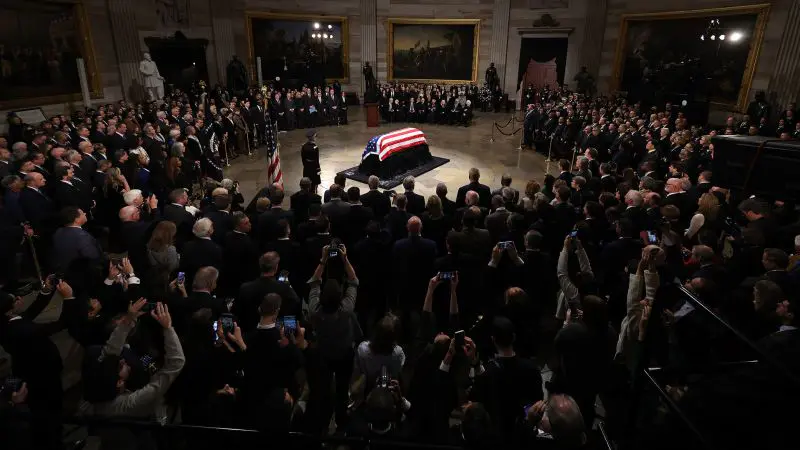
It’s the world’s most exclusive fraternity and, on Thursday, all five members of the so-called presidents club will gather to honor one of their own.
Presidents Bill Clinton, George W. Bush, Barack Obama, Donald Trump and Joe Biden are expected to attend the state funeral of former President Jimmy Carter, who died December 29.
It’s an exceedingly rare convening, and it will mark the first time all of the club’s living members will come face to face since the funeral of George H.W. Bush in December 2018.
Six years later, the group has a sharply fractured dynamic that will be closely watched at the Washington National Cathedral service. The former presidents have directly, and indirectly, spoken forcefully against Trump, who mounted a successful political comeback after his defeat four years ago and who in less than two weeks will return to the White House.
“Definitely in modern history — from Kennedy on — there hasn’t been a more contentious moment between these men,” said Kate Andersen Brower, the author of “Team of Five: The Presidents Club in the Age of Trump.”
Linked by the shared experience of having served in what one of their predecessors — William Howard Taft — once described as “the loneliest place in the world,” the five living American presidents will gather “at a funeral for a man who always stood a bit, figuratively, apart from them,” said Brower.
The presidents club, by nature, is complicated by past rivalries and future legacies. Those complications have only intensified as Trump, who has railed against all of his fellow presidents, is returning to the White House. Yet regardless of party, the members — so far, all men — are bound by the singular experience of serving in the Oval Office.
The long life of Jimmy Carter spanned 17 American presidents, an extraordinary stretch from Calvin Coolidge to Biden. At 100, he was the oldest living president — and longest-serving member of the presidents club, though he charted his own course during his 43 years after leaving the White House.
In death, Democrats and Republicans alike rushed to pay tribute to Carter’s legacy and the post-presidency example he set for decades.
But in life, Carter’s relationships with presidents were often more fraught, with Democrats like Clinton and Obama rarely seeking his guidance or publicly turning to him for fear of being too closely associated with a presidency that ended in defeat after one term.
In a tribute to Carter’s life last week, Obama highlighted a line from Carter’s 2002 Nobel Peace Prize speech: “God gives us the capacity for choice. We can choose to alleviate suffering. We can choose to work together for peace.”
Yet when Obama won his Nobel prize in 2009, which came as a surprise during his first year in office, he made no mention of Carter. He did, however, single out John F. Kennedy.
In 2014, Carter candidly said that Obama did not reach out to him during his presidency. Asked by NBC News whether Obama seeks his counsel, Carter said, “Unfortunately, the answer is no. President Obama doesn’t.”
He cited the Carter Center’s “strong and public position of equal treatment between the Palestinians and the Israelis” as a reason for his distance from Obama: “I think this was a sensitive area in which the president didn’t want to be involved.”
Some presidents leaned on Carter’s experience and advice, as well as his diplomatic abilities. But Carter didn’t shy away from using his platform to speak out against his successors when he felt it was warranted, sometimes causing them difficulties.
Carter was critical of the George W. Bush administration, publicly lambasting the president and his handling of the Iraq War in a 2007 interview.
“I think as far as the adverse impact on the nation around the world, this administration has been the worst in history,” Carter told The Arkansas Democrat-Gazette, slamming Bush’s “overt reversal of America’s basic values.”
But Carter later offered Bush praise; at the 2013 opening of the George W. Bush Presidential Center, Carter extended his “admiration” to the 43rd president, heralding Bush for keeping his word and acting to end a 20-year civil war in Sudan.
As president, Clinton took Carter up on an offer to help de-escalate tensions with North Korean leader Kim Il Sung.
“The use of President Carter to resolve this conflict proved complicated, when he announced an unofficial agreement with North Korea to bring an end to the stalemate on CNN before allowing the Clinton Administration officials to review the agreement,” the Clinton Library said in a brief history of their relationship.
Carter later joined a diplomatic team along with former Chairman of the Joint Chiefs of Staff Colin Powell and Sen. Sam Nunn of Georgia to help “avoid an armed conflict with the military leaders of Haiti,” the Clinton Library said.
But the two reportedly sparred when Carter “went on CNN before meeting Mr. Clinton for breakfast and a planned joint news conference,” according to The New York Times.
Clinton presented Carter with the Presidential Medal of Freedom, the nation’s highest civilian honor, in 1999. Yet fresh tensions arose when Carter chose Bernie Sanders over Hillary Clinton in the 2016 Democratic presidential race.
Carter was in touch with Trump and his administration multiple times during the president-elect’s first term.
In 2018, Carter said that he received a briefing on North Korea following Trump’s announcement of new sanctions on the country and that he’d be willing to travel to North Korea on the administration’s behalf, an offer Trump never took him up on. In 2019, Carter wrote Trump a letter on US-China trade relations and spoke with him by phone.
But the relationship deteriorated later that year when Carter called for a full investigation into Russian interference in the 2016 election and suggested it “would show that Trump didn’t actually win the election.” Carter later issued stark warnings about Trump’s decision to withhold funding from the World Health Organization amid the Covid-19 pandemic.
Trump, for his part, called Carter a “nice man” and a “terrible president” during a G20 Summit news conference in June 2019.
In the days before and after Carter’s death, Trump railed against a pair of treaties Carter negotiated during his term regarding the Panama Canal.
In a news conference Tuesday, Trump went on an unprompted tangent criticizing Carter: “Giving the Panama Canal is why Jimmy Carter lost the election, in my opinion — more so, maybe, than the hostages,” he said, referring to the Iran hostage crisis.
Conceding that it’s “inappropriate” to discuss the Panama Canal in light of Carter’s death, Trump added, “It’s a bad part of the Carter legacy. He was a good man. Look, he was a good man. I knew him a little bit and he was a very fine person, but that was a big mistake.”
Trump extended warm condolences following Carter’s death in a formal statement describing the former president as “a truly good man” and “very consequential.” Days later, however, he took to social media to complain that flags on federal buildings would be at half-staff during his inauguration, a standard, monthlong procedure commemorating the death of an American president.
Carter, a child of the Great Depression, was the last president to routinely ask his fellow Americans to sacrifice. Whether turning down the heat and donning a sweater to limiting driving and gas consumption, Carter’s requests fell flat politically and created a caricature of a president from which his predecessors were eager to distance themselves.
In the height of the Great Recession, as the George W. Bush presidency ended and the Obama era began, Democrats in the West Wing were loath to seek Carter’s guidance or even mention his name. He was far more likely to be invoked by Republicans in a more disparaging and mocking tone.
But for Biden, there were no such reservations. He has long worn his love and loyalty to Carter on his sleeve, paying an early visit to the former president’s home in Plains, Georgia, and proudly reminiscing about how he was the first senator to endorse Carter’s improbable presidential candidacy.
“We believe being ‘right’ on the issues is not enough in 1976. Our nation and our party need a president who is not only right, but who has demonstrated ability to accomplish our common goals,” Biden and then-Sen. Birch Bayh wrote in a joint letter at the time, adding, “We believe that person is Jimmy Carter.”
Four years ago, Biden’s inauguration was the first one Carter had missed since his own swearing-in in 1977. His health was failing, but the relationship Carter had with Biden was the strongest he forged with any of his successors.
Biden is poised to make remarks Thursday during the state funeral at the Washington National Cathedral. In the waning days of his presidency, after decades of delivering tributes and send-offs, Biden will do something for the first time: eulogize a fellow member of the presidents club.
With his successors and his predecessors, Carter marched to his own beat. He created relationships with some presidents — notably extending an olive branch early and often to Gerald Ford, whom he defeated in 1976 — while never forging a true connection with Ronald Reagan, to whom he lost in 1980.
Carter and his wife, Rosalynn, were slow to get over slights from official Washington — perceived or real — after they left the White House. Carter was the last to follow the Harry Truman model of not profiting from a post-presidency through paid speeches or other endeavors.
Chip Carter, the late president’s son, made a passing reference to the lingering sentiment of his parents as they returned home to Georgia and took control of forging their own legacy.
“Dad’s legacy from Georgia, the governor’s office, and from the presidency, was a little bit rough at the end of it because of our opposition and the way they framed us,” Chip Carter said Saturday in Atlanta, “which was probably somewhat true and somewhat not.”
Jimmy Carter lies in state at U.S. Capitol after eulogies by Kamala Harris and Republican leaders
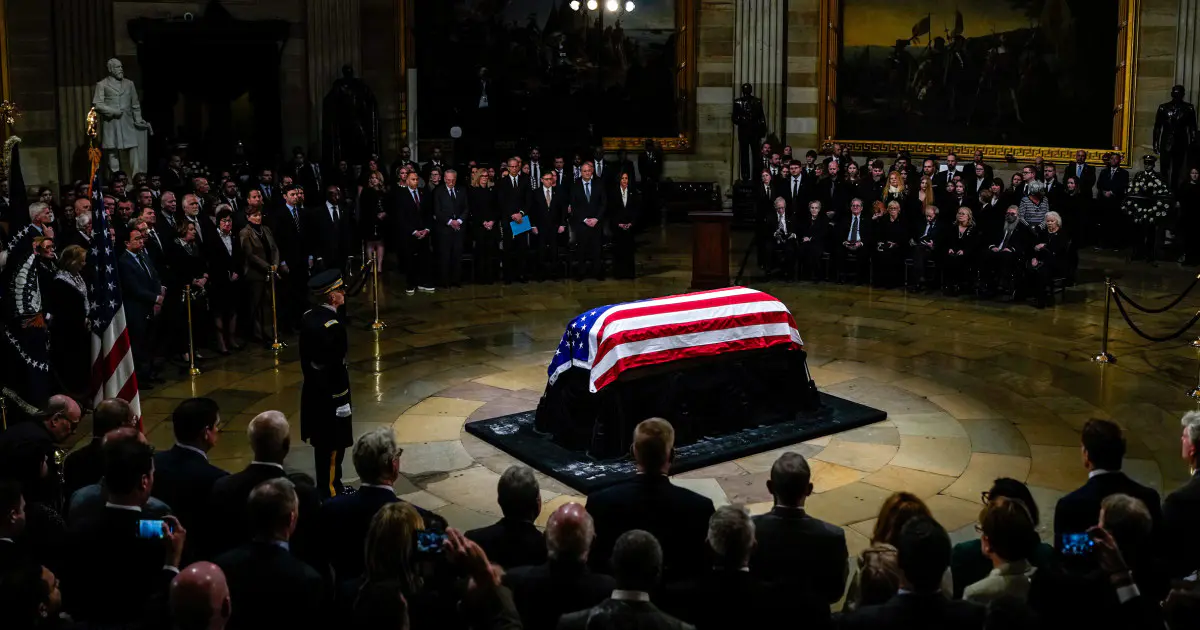
WASHINGTON — Former President Jimmy Carter arrived at the U.S. Capitol on Tuesday to lie in state after a memorial service attended by his family, Vice President Kamala Harris, members of Congress and other officials.
Congressional leaders eulogized Carter, the 39th president, praising his work in office, faith and volunteerism.
"Jimmy Carter was that all too rare example of a gifted man who also walks with humility, modesty and grace," said Harris, who recalled that she was in middle school when Carter was elected president.
"He lived his faith, he served the people, and he left the world better than he found it," she said.
Senate Majority Leader John Thune, R-S.D., highlighted Carter's spirit of volunteerism, building homes on behalf of the nonprofit group Habitat for Humanity, including a 1994 project in Thune's home state, South Dakota.
"He was here to get down in the weeds and the dirt, and he did that, literally, on numerous Habitat builds," Thune said.
House Speaker Mike Johnson, R-La., praised the "enduring legacy that he leaves, not only upon this nation, but upon the world."
Carter's casket arrived at the Capitol in a horse-drawn caisson at around 4:30 p.m. ET, with cannons fired upon its arrival and family members gathered at the top of the Capitol steps. Honorary pallbearers carried him into the rotunda, where his casket was laidon the Lincoln catafalque, a platform built to support President Abraham Lincoln's casket and now used for such ceremonies. It will be open to public viewing from about 7 p.m. to midnight. The statues of Lincoln and other presidents — including George Washington, Thomas Jefferson, Harry Truman and Gerald Ford, whom Carter defeated in 1976 — line the rotunda.
After the eulogies, the U.S. Naval Academy Glee Club sang "America," and congressional leaders laid wreaths on the casket.Several members of the Supreme Court, including Chief Justice John Roberts, Brett Kavanaugh and Elena Kagan, paid their respects, as well as Transportation Secretary Pete Buttigieg and Defense Secretary Lloyd Austin. Washington Mayor Muriel Bowser also attended.
Carter's body will lie in state through Thursday morning, when there will be a service at Washington National Cathedral.
Tuesday's events began in the morning with the transporting of Carter's remains from his presidential library in Atlanta to Joint Base Andrews in Maryland near Washington. From there, Carter and his family traveled by motorcade to the U.S. Navy Memorial on Pennsylvania Avenue, between the White House and the Capitol.
At the Navy Memorial, which Carter authorized in 1980 after it was approved by Congress, his remains weretransferred from a hearse to a horse-drawn caisson for the funeral procession to the Capitol. The procession is designed to mirror Carter's inaugural parade on Jan. 20, 1977, when, instead of riding in the presidential limousine, he and his family walked from the Capitol to the White House, the military release said.
The White House Historical Association noted, "This was the first time a president walked the pavement of Pennsylvania Avenue after the inauguration ceremony," demonstrating Carter's desire to make the presidency accessible to all people.
The public is invited to honor and celebrate Carter's life along the funeral procession route on Pennsylvania and Constitution avenues to the Capitol, his family said.
The last president to lie in state at the Capitol was George H.W. Bush in 2018.
Carter, the longest-living former president, died at age 100 on Dec. 29. He had been living in hospice care since February 2023 at his home in Plains, Georgia.
President Joe Biden, who is expected to give a eulogy Thursday morning at the cathedral service, has declared the day a national day of mourning. After the service, Carter's body will be flown back to Plains and to Maranatha Baptist Church, where he taught Sunday school for decades, followed by a private burial.
